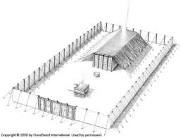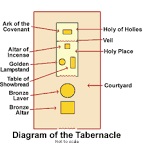 If something isn't holy it is
If something isn't holy it is
either neutral or common
common (there is no neutral)
 Can we do anything while worshiping God?
Can we do anything while worshiping God?
God considers many practices as unacceptable worship of him
We'll begin with the incident in the Bible from which the name "strange fire" comes. Aaron will be the first of the priestly order and his sons will continue as priests until the end of that covenant. At this time God has been instructing the priestly order in how they are to perform the various functions. In this incident the day had come when they are to perform the tasks as they have been instructed. At this point Aaron, as the high priest, had been performing his functions
[...] But the breasts and the right thigh Aaron presented as a wave offering before the Lord, just as Moses had commanded.
22 Then Aaron lifted up his hands toward the people and blessed them, and he stepped down after making the sin offering and the burnt offering and the peace offerings. 23 Moses and Aaron went into the tent of meeting. When they came out and blessed the people, the glory of the Lord appeared to all the people. 24 Then fire came out from before the Lord and consumed the burnt offering and the portions of fat on the altar; and when all the people saw it, they shouted and fell on their faces.


Moses and Aaron had done the sacrifices in the way that God had commanded. As a result they were acceptable to God and he revealed his glory to the people and consumed the offerings with fire.
Leviticus 10
1 Now Nadab and Abihu, the sons of Aaron, took their respective firepans, and after putting fire in them, placed incense on it and offered strange fire before the Lord, which He had not commanded them. 2 And fire came out from the presence of the Lord and consumed them, and they died before the Lord. 3 Then Moses said to Aaron, “It is what the Lord spoke, saying,
‘By those who come near Me I will be treated as holy, and before all the people I will be honored.’”
So Aaron, therefore, kept silent.
Aaron's two oldest sons have decided to put together something to offer to God. The Bible doesn't say why they thought they should do this. Perhaps they were as impressed as the people that God had sent fire to consume the sacrifices and they want to do it themselves and see it again. Perhaps it was worse than that and they wanted to glorify themselves. We can't know for sure.
In doing it their own way, instead of the way that they had been instructed, they had failed to treat God as holy and they had failed to honor God before the people. To say that God is holy is to say that God is separated from all that is common (ordinary, unholy, profane). Everything that is not holy is common. They failed to treat God as holy because they created a sacrifice of their own design, which was thus common. They failed to honor God before the people because they disobeyed his instructions. It's also possible they sought to honor themselves.
Moses says something important here when he quotes the words "By those who come near me". Christians generally don't understand that these sacrifices were the only way then that a person could draw near to God. Even so, the people could only draw so close. The priests could come closer and only once a year the high priest could enter the holy of holies. In positions where they drew closer to God, more was expected of them in obedience
Moses reminded Aaron they were in the process of worshiping God and they must continue. Despite his two oldest sons lying dead in front of him, Aaron knew they must not cease that worship to attend to the dead. God was more important.
4 Moses called also to Mishael and Elzaphan, the sons of Aaron’s uncle Uzziel, and said to them, “Come forward, carry your relatives away from the front of the sanctuary to the outside of the camp.” 5 So they came forward and carried them still in their tunics to the outside of the camp, as Moses had said.
6 Then Moses said to Aaron and to his sons Eleazar and Ithamar, “Do not uncover your heads nor tear your clothes, so that you will not die and that He will not become wrathful against all the congregation. But your kinsmen, the whole house of Israel, shall bewail the burning which the Lord has brought about. 7 You shall not even go out from the doorway of the tent of meeting, or you will die; for the Lord’s anointing oil is upon you.” So they did according to the word of Moses.
Moses instructed the remaining priests that they were then in a special circumstance, God's anointing is on them. If they begin mourning for their dead now, God will break out against all of the people. God is most important.
8 The Lord then spoke to Aaron, saying, 9 “Do not drink wine or strong drink, neither you nor your sons with you, when you come into the tent of meeting, so that you will not die — it is a perpetual statute throughout your generations — 10 and so as to make a distinction between the holy and the [common], and between the unclean and the clean, 11 and so as to teach the sons of Israel all the statutes which the Lord has spoken to them through Moses.” (Leviticus 9:21-10:11)
There can only be one reason why God mentions drinking wine here - the two dead sons of Aaron must have had enough wine to drink that their judgement wasn't clear. In this condition they forgot their place.
God institutes a new statute and says it will serve to show them the importance of knowing holy from common and clean from unclean. Both the holy / common difference and the clean / unclean difference have come up here. God was holy and the temple instruments had been sanctified for holy purposes and they were to be used only for that purpose. The priests were not to make themselves unclean while in service. To touch dead bodies would have done so.
 If something isn't holy it is If something isn't holy it is
|
special either neutral or common common (there is no neutral) |
 Can we do anything while worshiping God? Can we do anything while worshiping God?
|
God appreciates that we use our own personal style to direct us God considers many practices as unacceptable worship of him |
| If someone dies during our worship service, what would happen? What should happen? | |